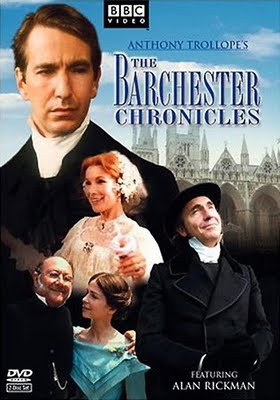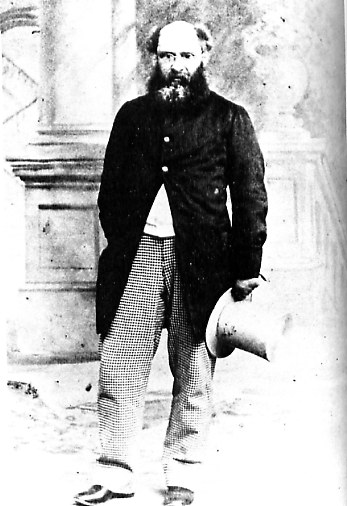Rare Disappointment from BBC
October 30th, 2011
Yes, I’ll own it publicly. I am, like many women interested in historic fashion, generally a sucker for BBC literary miniseries. I loved North and South, Bleak House, and Daniel Deronda. And I even went so far as to purchase my own copy of Pride and Prejudice. So you can imagine my excitement when the DVD of Barchester Chronicles arrived last week. Filmed in the 1980s, it’s chock-a-block with BBC stock players, exquisite (and mostly accurate) costumes, and more lace curtains than you can shake a stick at. Alan Rickman steals the show as Rev. Slope, revealing many of the mannerisms that he would later use for the slightly-less-slimy Professor Snape of Harry Potter fame.

But for all that, I couldn’t seem to enjoy the film. Perhaps it was too long (nearly five hours). Or perhaps it was the script. I shall never understand why modern writers feel the need to revise dialogue written by literary masters. It just dripped along, without any of the clever sparkle that enlivened the books — particularly Barchester Towers, which made me laugh out loud.
And while I’m at it, I have one last quibble. The books were written in the late 1850s, early 1860s. But for some reason, the film’s costumers chose to include a number of dresses that were so obviously early 1850s. It’s almost as though they had left-overs from a Dickens production, which, come to think of it, they probably did.
Escape from Barsetshire
October 18th, 2011
While recovering from a cold over the weekend, I finally finished The Last Chronicle of Barset. I nearly shouted for joy as I turned the final page. Not that I didn’t enjoy my Trollopian sojourn this year, but really, enough is enough. I am sure I shall eventually tackle the Pallisers, and I even have a copy of The Way We Live Now lurking on my shelf. For now though, I’ve had my fill.
Like Hardy’s Wessex, Barset has become a real county to me. I am conversant with its geography, topography, politics, and social moires. I know which families I’d be likely to get on with, and which invitations I’d do better to decline. I am familiar with everybody’s strengths and failings, and what they like to drink after a big dinner. And you can bet I took lots of notes, culling quotations in support of various topics I’ve been researching. I’d share some with you, but I fear all the good ones are still in the little notebook of “gleanings” that I keep on my night table, waiting to be transcribed.

Map of Barsetshire, courtesy of The Trollope Society.
For me, Trollope is alternately enthralling and deadly dull. The action often proceeds like a radio soap opera, inching along painfully toward an obvious conclusion. But for chapters at a time, he hits a kind of a rhythm and you are borne along most pleasantly on a rush of clever dialogue, intriguing thought, and perfectly believable emotion.
My favorite part of the Chronicles of Barsetshire was the glimpse they offered into clergical doings. I’m fascinated by the minutiae of religious doctrines and requirements in the mid-19th century. The dread of Roman Catholics is amusing, as is the mistrust of Jews, and curiosity about the mysterious “Musulmen” and “Hindoos.” But I particularly love the partisanship within the Church of England (or similar American sects). It seems silly to quibble over such tiny details, but I suppose it was all quite serious to them at the time — particularly as their cherished hope of heavenly reunion with departed loved ones depended on getting it right!
As is my wont, I couldn’t help applying Trollope to the world I see around me in 2011. I began to imagine how he might write about the scandal rocking the Catholic Church in America today — particularly as the news reports last week announced the first bishop to stand trial. It’s wicked I know, but somehow I can’t stop myself from laughing at the seedy priests and ineffectual bishops that Trollope would have written into the story. Alas, even were he alive today, I fear Trollope wouldn’t touch it with the proverbial ten-foot pole. It would be left to sharper pens, a la Dickens or Fielding, though they might not do it so much justice. Now Mark Twain might have a shot. Or perhaps Melville?
Can You Forgive Me?
June 23rd, 2011
I am just returned from a fortnight’s sojourn in sunny California, and I have a confession to make. I was wrong about Anthony Trollope.

Flowered Fence
Three days after we arrived, an old ballet injury that had been aggravated by the plane ride began to act up with a vengeance. I spent the next week lolling about with an ice pack. Despite the pain and frustration, I have to admit that there are worse places to be stranded with a sore back (note the snapshots littered throughout this post) and I was waited on hand and foot by the world’s most attentive helpmate. Plus, for the first time I can remember, I was allowed to read just as much as I liked.

Diving into a freshly plowed field
Among others, I made my way through two more from the Barsetshire Chronicles: Barchester Towers and The Small House at Allington. (Yes, I know I missed a couple in between, but my favorite Central Coast bookstore didn’t have them in stock.) I have to admit they were beyond charming. I couldn’t turn the pages fast enough, and spent any number of chapters laughing myself silly. I still hold that The Warden doesn’t show Trollope at his best, but perhaps he was still hitting his stride. And yes, I guess it took me a little while to get used to his style. It was sort of like the first time I read Murders in the Rue Morgue and bewailed its lack of sophistication when compared to later crime dramas; forgetting of course what those later, slicker stories owed to Poe’s trailblazing.

Bitty Bungalow
So I bow my head with just a touch of shame for my prior jump to conclusion, and present myself as very fond indeed of Mr. Trollope, with thanks to all those who encouraged me to give him a second chance.

Picking Walnuts
Since I didn’t sew a single stitch while I was away, you’ll probably hear next about the rest of my recent book pile while I get back into the swing of things with my needle. It was lovely to be away; the weather was ideal and we stayed in a real California Bungalow of the most darling proportions. Despite my injuries I still managed to drink more than one cup of tea with dear friends, soak in the palm-bedecked Avila sulfur spring, and even got to feed carrots to a certain threesome of handsome horses.

Our Friends' Goats
Redeemed by the Ending
June 1st, 2011
Well, I have to admit that the final chapters of Anthony Trollope’s The Warden (released in 1855) went much faster than the earlier ones. It’s actually a very short novel, purposely so, according to the author, who wanted to publish it in a single volume (longer works were usually issued in two or more parts during the 19th century). If you’re at all interested in the politics and finances of mid-19th century England, or if you have a fondness for church dramas, The Warden may be right up your alley. The romance between Mr. Bold and Eleanor Harding is rather an afterthought, though it does add a certain lightness to an otherwise serious plot. I did like the way Mr. Harding played his imaginary cello whenever he was nervous — I’ve occasionally caught myself doing the same thing.
After finding the ending of The Warden so much more engaging, I have been forced to revise my hastily-formed opinion of Mr. Trollope’s scribblings. I will, at least, give him another go round. I’ve got a copy of The Small House at Allington all ready to go, though it may be a few weeks before I actually get to it. And of course, I am eager for suggestions — what is your favorite book by Trollope? Or would you rather recommend another author altogether?
Just don’t bring up Zane Grey please. As soon as I finished The Warden last week, I headed for Stairs of Sand. Boy, oh boy. I’m hooked by the story, so will put up with the dialogue to find out what happens, but sheesh. My eclectically well-read husband questions whether Zane Grey actually existed, or if he was just the nom de plum of a group of early 20th century western wordsmiths, getting paid by the pound to churn out pulp. I heard a radio interview last month with a man who claimed to have seen a cancelled check endorsed by Zane Grey at auction, so I think he did exist. Whether that existence can be justified by this book, well that’s beyond the scope of even my pretensions.

Further proof that he existed — this is Mr. Grey posing with his horse, Juan Carlos.
Bored in Barchester
May 28th, 2011
It grieves me to say it, but I don’t think I like Anthony Trollope very well. I began The Warden a few days ago, and have so far yawned my way through about two-thirds of the novel. I find the characters insipid and inconsequential, and while his arguments are interesting (I am very fond of church disputes, though prefer the doctrinal over the financial), the satire is ruined by too much cleverness without enough content.
I suppose Trollope’s defenders might argue that his finest barbs are soaring over my head. Or the less dogmatic among them might suggest I chose a poor specimen of his work with which to begin. But I can’t help feeling him to be a sad mix, combining the worst of the maudlin mid-19th century with a crude beginning of the delicate wit that characterizes so many British works of the later 19th and early 20th centuries.

Being nearly incapable of leaving a story half-finished, I suppose I will finish The Warden. Who knows, I may try another of his novels after that, just to be sure of my own feelings. I am generally quite fond of curmudgeons — even those who wear checked trousers.
Older Posts »